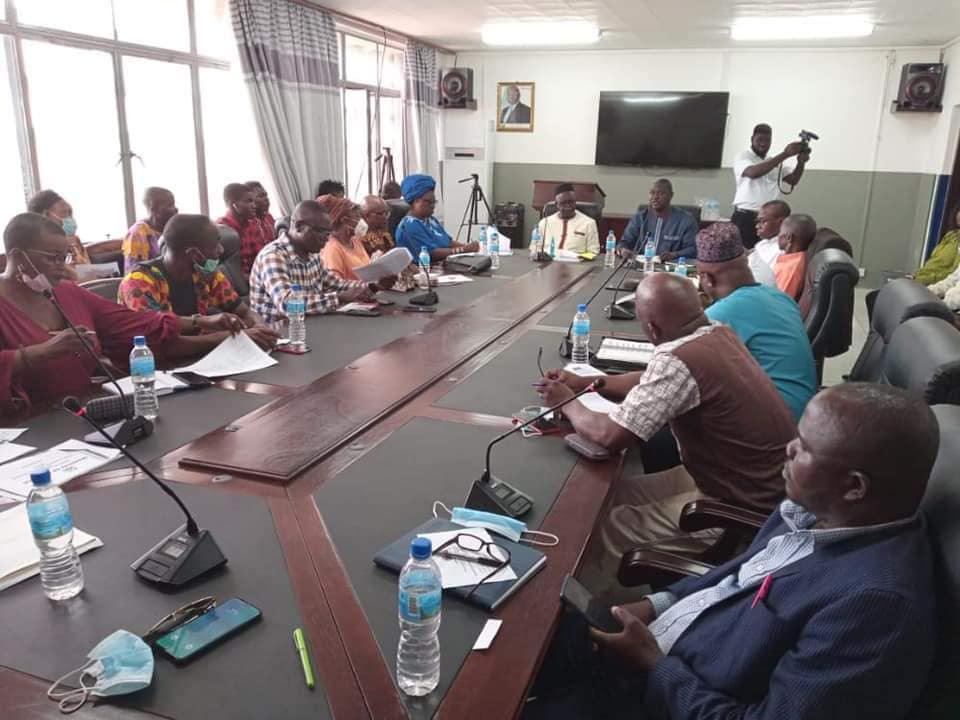Wide cross-section of education stakeholders, including national and local government, civil society organizations, education development partners, parliamentarians, youth representatives and the private sector come together to re-imagine education in Sierra Leone and set bold goals for the country as part of consultations for the Transforming Education Summit which will take place in New York in September 2022.
The National Consultation took place on Wednesday 1st June at the Radisson Blu Mammy Yoko Hotel in Freetown.
The purpose is to send a clear message from Sierra Leone answering the United Nations Secretary General’s call to ‘mobilize political ambition, action, solutions and solidarity to transform education: to take stock of efforts to recover pandemic-related learning losses; to reimagine education systems for the world of today and tomorrow; and to revitalize national and global efforts to achieve SDG-4.’.
Speaking during opening session of the meeting, the Minister of Basic and Senior Secondary Education Dr David Moinina Sengeh said Sierra Leone has come far in the last four years, he however stated that the nation is still laying the foundation, noting that close to a million more children have been enrolled in schools, developed new curricula from pre-primary education to junior secondary education unto senior secondary education and civic education curriculum.
“We’ve developed policies among them include Radical Inclusion in Schools, Integrated Early Childhood Development, and Integrated Home Grown School Feeding. We are seeing the highest number of pupils passing the National Primary School Certificate Examination (NPSE), Basic Education Certificate Examination (BECE) and West African Senior Secondary Certificate Education (WASSCE) in our country’s history and we are making huge progress in the Early Grade Reading Assessment (EGRA) and Early Grade Mathematics Assessment (EGMA),” he said.
According to the Minister, Sierra Leone has achieved gender parity in enrollment at all levels in basic and senior secondary education and that doesn’t come for free.
He thanked President Julius Maada Bio for his leadership and for the allocation of over 22% of the country’s budget to education, and also commended multi-donor partners for their support to education.
The Minister of Tertiary and Higher Education Professor Alpha Tejan Wurie regarded education as the bedrock of human progress, noting that the world is stepping up to the change in transforming the education sector.
“We are now recognizing that we cannot continue on scholarships, we have to be transformative and think of other ways to fund higher education. As a Ministry, we have started talking about the student loan scheme and that scheme will be operationalized in the 2022/2023 academic year,” he said.
The United Nation Resident Coordinator Dr. Babatunde A. Ahonsi said well into the 21st century, millions of children and young people are still not in school, and millions of those who are in school are not really learning, not really achieving the kind of learning that is relevant for their lives in the world they are living in, adding that with the COVID-19 pandemic, these challenges have only been exacerbated.
“In 2021, UN Secretary-General Antonio Guterres announced that a Transforming Education Summit (TES) would be convened in September 2022 as a global strategy to avert a generational catastrophe and rethinking education systems, especially in the context of COVID-19, which has disrupted education systems globally, affecting the most vulnerable learners the hardest,” he said.
He said the Transforming Education Summit intends to put the spotlight on education and provide an opportunity for education stakeholders to advocate for sufficient, effective, and equitable financing of education at global and domestic levels.
Mr. Ahonsi said transformative actions, which include getting every child ready for school, ensuring they acquire basic literacy and numeracy skills, and that attention is given to the needs of the most marginalized including girls and children with disabilities, are the expectations from this journey to rebuild the education systems.
“In this regard, on behalf of the UN Country Team in Sierra Leone, I congratulate the Government of Sierra Leone for being a continental leader in reforming the education sector and making ambitious commitments to improve learning processes and outcomes.
The Government of Sierra Leone continues to invest more than 20 percent of its national budget in education. The Free Quality School Education (FQSE) Programme, one of the Government’s flagship programmes, is dedicated to promoting quality education for all children,” he said.











